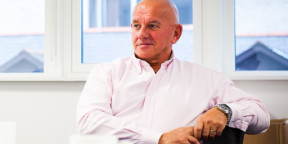Richard’s story
“I had to relive it, every day and every night. Luckily for me, Combat Stress was there to help”
As a young boy, it was Richard’s ambition to join the Armed Forces. Coming from a family in which his great grandparents, grandparents, and father all served meant that it almost felt like a family tradition.
At 25 years old, Richard joined the First Battalion Light Infantry, and undertook several tours of Iraq, until one incident proved too much for his mental health.
Called out to a roadside bombing, he stumbled across three live IED’s while surrounded by gasoline tankers and civilians. Their investigation into the location of the suspected bomber was then halted after it become clear they had run straight into a minefield.
“Stuff like that, well it completely changes you.”
Richard was shaken by the experience, but it wasn’t until much later when granted some downtime, to unwind and collect his thoughts, that his mental health dramatically took a turn for the worse. He was sectioned before leaving the army one month prior to his leave date in 2007. But returning to civilian life only made things worse.
I had too much time on my hands, and soon my aggression got really bad and my patience had all but gone. I was putting a horrible strain on my family.
“I was in touch with a local NHS Mental Health service immediately after leaving the army, but it wasn’t until a friend informed me about Combat Stress, that things began looking up.”
Richard underwent a range of one-week and two-week programmes over the space of a couple of years, and his mental health improved. But in 2011, his sister tragically passed away, causing him to break away from the support he was receiving from Combat Stress.
By 2015, things had started to spiral out of control. Richard was plagued constantly by mental blocks and tried to take his own life.
“I had walked out on my family. I couldn’t focus, couldn’t think straight. I was just cold, even when seeing my son, I felt no love, care, or any emotion really. I felt so worthless, and didn’t want to be around anybody, and so one day I just packed my car and I left.
“I re-engaged with Combat Stress, and underwent several outpatient courses, under the guidance of some brilliant Occupational Therapists. I was also put in touch with some other local veterans, and it was the perfect outlet and way to socialise.
“I feel so uplifted now and I am in such a better place. I now understand my mental health and can better cope with any bad thoughts or bad days. I can even do things I never thought I’d be able to do again. I went shopping for the first time in years, and never once got to the point where I was really stressed out, and wanting to get out of there quicker than I got in.
Richard, is now working at Leeds Beckett University, talking to doctors, nurses and psychologists about military mental health, giving them an insight into a soldier’s perspective and struggles with PTSD.
“To be able to open up about my experiences is incredible, it really shows how far I’ve come. I feel like I have a new purpose, and if the work I’ve done can help just one person, then I’m happy.
I had to relive it, every day and every night. Luckily for me, Combat Stress was there to help. So, take that leap. Make that call. It will change your life.”
Richard has also shared his experiences with us as part of the Combat Stress 100 project, find out more by clicking the button below.
IS THERE SOMEONE I CAN CALL AND TALK TO?
If you're struggling with your mental health, our free 24-hour Helpline 0800 138 1619 is available to veterans and their families.


